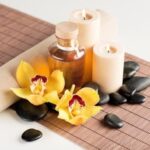Introduction
Feng Shui is a Chinese philosophy of balancing the elements in your living environment. It originated over 2,500 years ago, using principles of Chinese geomancy and astrology based on Taoism. Feng Shui practices work to promote harmony in a space by creating a positive energy flow and enhancing one’s physical and mental well-being. Eastern spiritual feng shui is all about working with the energy of nature and how it affects us all within our home environments.
Eastern spiritual feng shui aims to create a comfortable atmosphere in which one can relax, such as through natural and recycled materials and artwork from nature. It is believed that this energy flow helps bring balance, positive emotion and good luck into our lives by influencing our decision-making abilities and overall happiness levels. Colors are also thought to play a role in harmonizing the energy within a room; each color has its own unique meaning when used correctly which can help balance the yin-yang principle inherent to Eastern spiritual feng shui. Additionally, incorporating plants or flowers into the decor of your home or workspace can have similar effects on the atmosphere due to their ability to absorb environmental pollution while emitting oxygen into the air. Other items like wind chimes or mirrors can further enhance these effects if placed strategically throughout the space according to traditional guidelines used in Eastern spiritual feng shui teachings. Lastly, keeping personal belongings or pictures that evoke inspiring memories closeby may help maintain both emotional stability as well as good health over time.
Color Theory Basics and Their Connection to Feng Shui
Eastern Spiritual Feng Shui has been used for centuries throughout Asia and regions of China as a practice of balance and harmony. During this practice, understanding the basic color theory and how it pertains to Feng Shui is highly important. Color theory is defined as the relationship between combinations of colors that result in appealing visual effects, psychological interactions, and overall wellbeing.
Each color carries a specific energy which may affect our physical and emotional wellbeing. This energy can be tapped into during Eastern Spiritual Feng Shui practices in order to create harmony within the space”be it a personal home or business environment. For example, each hue of green can represent different emotions due to its analogous relationship with nature: Green vibes include new beginnings, growth, abundance, security, health and fertility. Similarly, blue brings forth feelings of tranquility and peace coupled with mental strength since blue is often associated with water which has been known for its calming properties for thousands of years.
Understanding one’s individual perception of colors allows for individuals to further create an atmosphere conducive for their lifestyle essentials particularly during Eastern Spiritual Feng Shui practices. Incorporating the mindful use of several colors through an array of finishes such as texture on fabrics or painting are ideal ways to bring out the essence needed in complementing a desired energy flow within a space. Thus changing environments (home and/or office) into tailored energetic havens suited with positive energies so alignment can be achieved towards ones desired goals while also enjoying them along their journey towards goal manifestation.
Applying Feng Shui Principles
Eastern spiritual feng shui is a technique that uses energy and objects to create harmonious spaces. It involves establishing perfect balance in the home or office space by carefully selecting certain items and placing them in specific locations according to ancient Chinese principles. Some of the most common feng shui elements incorporated into a space include plants, water features, wind chimes, mirrors, and crystals. These elements bring a sense of peace and serenity to any room while helping to regulate the flow of positive energy or “chi” in order to encourage better health, joy and success.
The application of eastern spiritual feng shui goes beyond aesthetics; it helps enhance your life as well as your emotional well-being. For example, if you are feeling sluggish and unmotivated, sprucing up your workspace with vibrant flowers will help energize the atmosphere as well as give you an extra burst of motivation. Additionally, hanging crystal clusters near windows will regulate chi for peaceful sleep at night ” promoting good rest and improved concentration throughout the day. If luck seems to be slipping away from you, displaying symbols such as Buddha statues can bring in more fortune when strategically placed around the house. Finally, decorating with proper Feng Shui elements like wind chimes over doorways can ward off any negative energy coming from outside environments ” making it an ideal choice for home protection against any danger threatening our daily life. With all these available opportunities posed by Eastern Spiritual Feng Shui principles we can easily create beautiful spaces while addressing physical and mental health needs without overwhelming our budgets or time commitments.
Incorporating the Five Elements
Eastern Spiritual Feng Shui is an ancient Chinese philosophy and system of home decoration focusing on how the placement of objects in a home can create harmony. This form of feng shui views each object as having energy associated with it, which must be balanced to achieve a harmonious living environment. To achieve this balance, Eastern Spiritual Feng Shui uses five core elements: Wood, Fire, Earth, Metal and Water.
Wood is considered to signify growth and creativity; Fire symbolizes power, energy and passion; Earth relates to stability, practicality and solidness; Metal stands for clarity and strength; and Water embodies stillness and purification. Each element let off different energies that need to be balanced through the use of furniture arrangement, colors, textures and shapes. Items such as wooden tables with curved edges will bring balance to a living space by adding the element of wood while also creating a pleasant shape. Pillows in deep hues can evoke the element of fire while providing comfortable seating options. Plants are associated with various elements – depending on their size, color or leaves – so they are typically used liberally throughout a space when it comes to Eastern Spiritual Feng Shui design. Similarly, exposing walls made from earth materials like brick will bring the element of stability into the room design since Earth seeks grounding throughout its environment. Here metal is often used for accents like light fixtures or flatware decorations which allow it stand out from the other elements present in the room’s design. The fifth element ” water ” is more difficult to incorporate physically into interior designs but can instead be added through paintings or photographs of rivers or gardens.
Rebalancing Your Home and Life with Feng Shui
Eastern Spiritual Feng Shui is a combination of Chinese energy principles and practices that promote balance, harmony, and well-being in the home. These ancient traditions can bring positive energy into any living space and help to create an atmosphere that promotes success, peace, and good health. The fundamental goal of Eastern Spiritual Feng Shui is to maintain the equilibrium of the energetic energies present in your environment in order to create living spaces that foster balance and fulfillment.
When utilizing Eastern Spiritual Feng Shui, one should focus not just on physical objects in the home but on their spiritual significance as well. This approach involves making choices about furniture placement, color selection, and even aromatherapy with the understanding of how these elements will interact with one’s chi ” or energetic life force ” within the space. In addition to physically arranging furniture for improved energy flow, one can also incorporate aspects like wind chimes or crystals to further support balanced energy. Allowing natural sunlight into the home through proper window placement is also important for creating energy balance. Holistic healing practices such as yoga can be combined with Eastern Spiritual Feng Shui to help individuals stay connected with their personal chi while engaging in practical steps to improve their wellbeing and home environment at the same time. Incorporating mindful habits like daily affirmations or meditation can further enhance this process by connecting individuals with their highest vibration when they take part in balancing their homes.
Enhancing Careers, Health, and Relationships with Feng Shui
Eastern spiritual Feng shui is a practice which originated in China and revolves around the belief that altering spaces can bring positive energy and fortune. By applying the principles of this ancient philosophy, individuals can bring success and prosperity on both a personal and professional level. Practitioners work to create balance in their lives through rearranging the layout of rooms, placing lucky items, choosing the right colors, and utilizing other unique methods for achieving harmony with nature.
Eastern spiritual Feng Shui involves more than just arranging furniture to promote a sense of wellbeing. It can be utilized to cultivate specific career goals, improve health, foster healthy relationships and more. Different techniques may be used to draw in useful energies from the natural surroundings that support desired objectives. This includes deliberately selecting materials such as plants and crystals that are believed to attract good luck or encourage certain emotions related to the goal at hand. For instance, hanging wind chimes is said to bring better job opportunities while lighting candles or incense may represent cleansing practices associated with spiritual protection. Additionally, practitioners can declutter living spaces or use color psychology within the home environment in order to maximize positive energies and cultivate long-term success in different areas of life.
Finding Good Fortune with Feng Shui
Eastern spiritual Feng Shui is an ancient set of practices from East Asia that promote balance, harmony, and wellbeing in the home or workplace. It is rooted in Taoist philosophy and believes that the environment affects our lives. Practitioners use feng shui to create a harmonious destination for maximum energy.
The main goal of Eastern spiritual Feng Shui is to get rid of negative energies and welcome positive ones. In order to achieve this level of positive energy, practitioners rely on five elements”water, fire, earth, metal and wood ” as well as correspondences with other natural elements including the sun, moon and stars to bring balance into the space. They strive to create harmony between the physical environment surrounding them and its spiritual counterpart. This can be achieved by considering things like where vastu items such as furniture and artwork are placed in respect to qi (life force).
According to Eastern Feng Shui philosophy, there are certain steps one must take before attempting any type of Feng Shui ritual: firstly, it is important to clear away negative energy; secondly, any structural issues or clutter should be addressed; thirdly one should focus on directionality; fourthly prioritize furnishings that elevate spiritual energy; finally add plants or artwork for prosperity. Addressing these issues brings about prosperity into one’s life enhancing luck in work situations and encouraging better health overall by promoting peaceful feelings within your home or workplace. By preparing your space for good fortune you open yourself up to opportunities once considered untouchable!
Dealing with Negative Energy
Eastern spiritual feng shui includes the practice of shielding and protecting areas from negative energy. This can be done in various ways, such as placing positive intention-infused crystals or stones around one’s home or workspace, using plants for their protective properties, blessing the area with sacred smoke or incense, blessing water with mantras and using it to cleanse objects, performing clearing rituals like smudging with sage or Palo Santo wood and chanting mantras into each room. One also might hang wind chimes to bring more joy and harmony to an environment, especially outdoors. An ancient Chinese Taoist master said: “If you gather 100 years of auspicious chi on your property you will become wealthy. If you generate 100 years of evil influences you will suffer your entire life.” Therefore it is very important to shield an area away from negative energy and create sanctuaries where the energies can support us instead of make us ill. With use of special wards like amulets, spell bags, ritual candles infused with essential oils, herbs, divinatory tools like a compass card and/or charm pendants made from precious metals we can keep our space safe from malicious entities. Finally regular cleansing of every space from time to time is key in order to maintain positive chi that fuels creativity and joy when visiting or dwelling in any given place.
Conclusion
The Eastern spiritual school of Feng Shui provides a unique approach to structure and how we interact with our environment. It encourages us to be mindful of the energy around us and conscious of the patterns in our life. By practicing these principles, we can open ourselves up to potential areas of growth, increase opportunities for prosperity, eliminate unhealthy influences from our lives, and create inner peace. Ultimately, by implementing Eastern spiritual Feng Shui into your life you may find enhanced personal expression, an improved ability to manifest your goals, greater financial wealth and career advancement, better relationships, increased energy and vitality, improved behavior in children or pets, and a general sense of wellbeing. While it is impossible to guarantee such results by practicing Feng Shui due to its non-scientific nature, making this change could result in invigorating your relationship with yourself and your environment while uplifting all aspects of your life.

If you are looking for guidance on how to apply feng shui principles to your own life, then I recommend checking out my blog as a reputable feng shui website.





